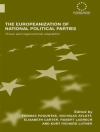In 1969 a small group of US scholars began discussing the possibility of starting a consortium of Western European Studies programmes. Europe was increasingly becoming an object of study and it was felt that greater coordination of the intellectual effort would help avoid duplication and further the acceleration of research. So began the Council for European Studies.
In commemoration of the founding of the Council fifty years ago, this volume brings together some of the most influential Europeanists writing today to take stock of the subject and to consider the most fruitful avenues for future research. With European democracy seemingly under threat from populism on the left and the right, the economies of countries still struggling to emerge from a decade of recession and stagnating growth, environmental concerns paramount and the quest for social cohesion a distant goal, the contributors to this volume bring their insight to bear on the fertile ground that the EU and the continent more broadly offer researchers.
The contributors – drawn from 52 institutions across the globe – present a wide range of perspectives on Europe’s past and present, and the key challenges facing its future, such as immigration, multiculturalism, nationalism and integration. Although it remains to be seen whether Europeans will continue to promote the dream of union or whether they will retreat back into their nation states, these essays offer valuable insights into how Europe might respond and the changing nature of what it means to be a European.
Зміст
Part I The study of Europe
1. The Council for European Studies at 50: looking back and looking ahead, Erik Bleich
2. European studies as an intellectual field: a perspective from sociology, Michèle Lamont
3. From Western civilization to critical European studies, Hélène B. Ducros and Louie Dean Valencia-García
4. Beyond exceptionalism in European studies, Catherine Guisan
5. Diversity or unity? The role of culture in European studies, Simon Fink and Lars Klein
6. The horizons of European culture, Randall Halle
7. Welcome to the “family”: integration, identity, and inclusivity in European studies, Sarah Cooper and Koen Slootmaeckers
8. Unexpected Europeanists: building a new cadre of European studies, William Collins Donahue and Martin Kagel
9. Europe past, present, and future: changing governance in higher education, Beverly Barrett
10. The future of European studies and higher education reform in Africa, Patricia W. Cummins
Part II Lessons from Europe
11. Studying Europe as a path to understanding the state of democracy today, Sheri Berman
12. Economic challenges and electoral politics in Europe, Peter A. Hall
13. Lessons from Central Europe’s dissidents, Lisa A. Baglione
14. Federalism, borders, and citizenship, Willem Maas
15. History’s lessons from the single market and the Maastricht years?, George Ross
16. The extraordinary, taken-for-granted achievement of Europe’s single market, Craig Parsons
17. Economic and Monetary Union: a live issue after 50 years, Dermot Hodson and Alison Johnston
18. Putting deprived neighborhoods back at the core of EU urban policy, Sonia De Gregorio Hurtado
19. The political integration of the middle class, Paul Marx
20. The leftovers: vulnerable populations in the global, post-industrial age, Cathie Jo Martin
Part III The changing face of Europe
21. Nativism across the Atlantic: the end of exceptionalisms?, Jan Willem Duyvendak
22. Governing migration: political contestation and policy formation, Jennifer Elrick and Oliver Schmidtke
23. Can Europe recover from its latest wave of us-versus-them politics?, Karen Umansky, Alberto Spektorowski, and Joel Busher
24. Fearing Muslims as the other, John R. Bowen
25. The challenge of Europe’s nations, Gregory Baldi
26. Can European states be “countries of migration”?, Justin Gest
27. Battling over Europe’s identity: right-wing politics, religion, and an uncertain future, Fabio Capano
28. Bosnia and Herzegovina between EU accession, unhealed trauma, and migrant crisis, Alma Jeftic
29. Social movements as a solution to European aporia?, Marcos Ancelovici and Guya Accornero
30. Belonging to Berlin: a case of bureaucratic dystopia, minority agency, and solidarity, Anlam Filiz
Part IV Europe’s future
31. Quo vadis Europa?, Juan Díez Medrano
32. Exit, voice, or loyalty? The collapse of national elite consensus on Europe’s future, Matthias Matthijs
33. Differentiated integration through more integration, decentralization, and democracy, Vivien A. Schmidt
34. Reflections on the direction of the European project, Mare Ushkovska
35. The EU’s rule-of-law crisis and the problem of diagonality, Csongor István Nagy
36. More union, more states, Josep M. Colomer
37. The EU’s challenge with size, sovereignty, and mutual benefit, Ludmila Bogdan and Twamanguluka N. Nambili
38. Brexit: the golden chalice of European demos formation?, Erin O’Leary
39. Who wants to live forever? Europe, Veronica Anghel
Part V Reflections on Europe’s world role
40. The world as invention, Benjamin Bennett
41. Defensive institution building, Shawn Donnelly
42. The EU and South–South cooperation, Shengqing Zhang
43. The enduring promise of the EU, Harris Mylonas
Part VI Final thoughts
44. Richie Havens, Beethoven, and the music of revolutions, Steven Johnson
45. The dream of Europe: Camelot in the time of Mordred, Erik Jones
Про автора
Erik Jones is Director of the Robert Schuman Centre for Advanced Studies at the European University Institute. He is also Professor of European Studies and International Political Economy at the School of Advanced International Studies (SAIS) of the Johns Hopkins University (on leave). He is co-editor of Government and Opposition and contributing editor of Survival.












